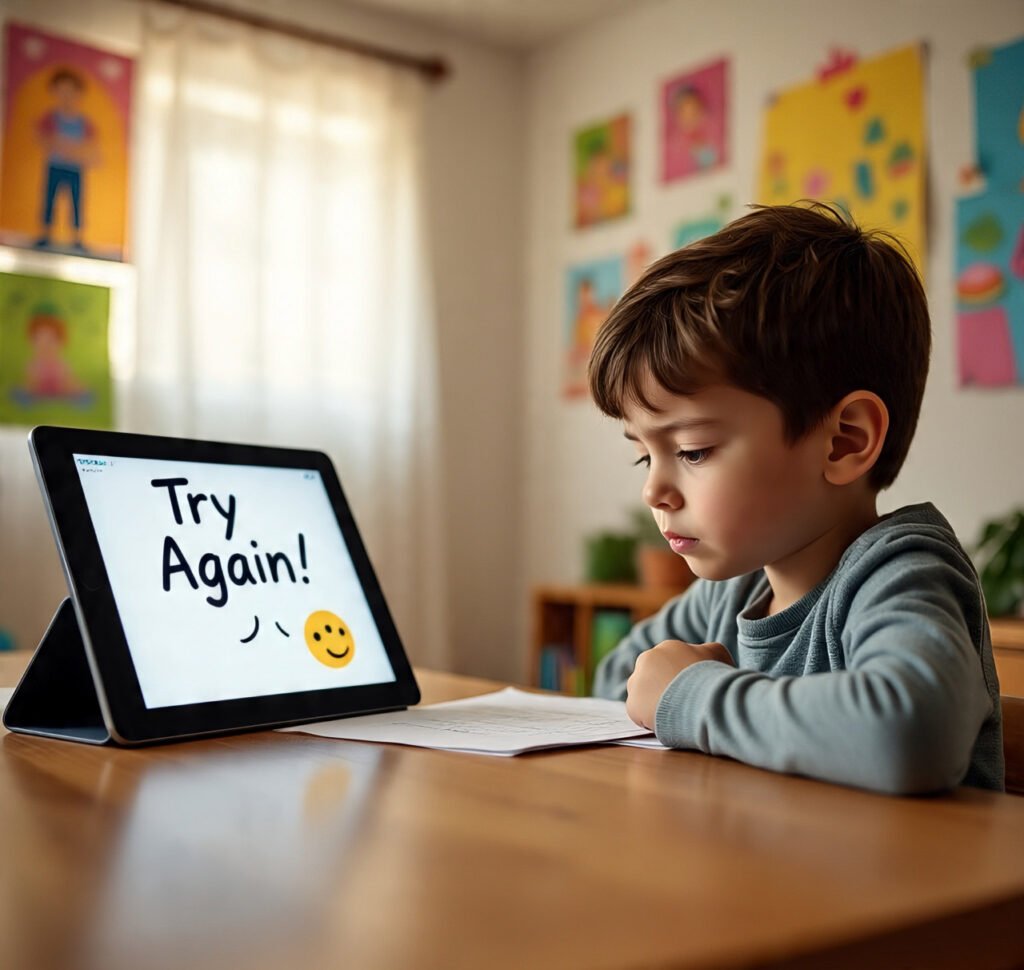Table of Contents

The Math Quiz Game was not simply another on-screen activity—it became the catalyst that ignited my child’s confidence.
As a mother, I’ve seen my son step away from numbers as though they were creatures hiding under his bed. He’d complain about homework, steer clear of word problems, and say “Math’s just not for me.” I took him at his word—until I found FocusFun’s Math Quiz Game. What began as a five-minute experiment became a change I didn’t see coming. It didn’t merely hone his math ability; it rebuilt his perception of himself.
Here’s our story — and 7 moments that converted his zeros into hero moments.
1. The First Right Answer (a.k.a. The Lightbulb Moment)

It was a peaceful night. I gave him the tablet, already ready to watch him log out of the app in 60 seconds or less. But the Math Quiz Game presented a pizza slice question, and something flipped.
“Four slices out of eight? That’s half!” he yelled.
Not only was he correct—exactly—he was euphoric. That single victory became the emotional foundation for the rest. He craved more. And math, for the first time, wasn’t a nuisance—it was a challenge that he could overcome.
2. The Wrong Answer That Didn’t Hurt

What I appreciate most in FocusFun’s design is how it appreciates effort and movement towards progress, rather than perfection. During his third round, he answered a subtraction question incorrectly. I prepared myself for a meltdown.
Instead, however, the game provided a timely hint and invited him to retry.
Oops! That’s okay—think of it like taking away from your toy cars.
That attitude made a difference. It eased failure, making it a curiosity enhancer. He didn’t merely admit to his error—he wanted to correct it.
3. Cracking the ‘Speed Round’ Like a Pro

As he progressed, he accessed the Speed Round—a function that clocks questions and pays premium for fast thinking. I anticipated panic. What I witnessed was concentration, enthusiasm, and a competitive fire.
He broke his own record the next day.
I’m quicker than yesterday! Look, Mom, I did it.
It wasn’t about winning compared to others. It was about winning compared to himself yesterday. A humble yet strong sort of victory.
4. Using Math in Everyday Life (Unknowingly)

He asked me one afternoon at the store,*If each pencil is ₹15, and we buy 3, that’s ₹45, isn’t it?
My jaw almost dropped.
This wasn’t a worksheet. It wasn’t a classroom. It was life—and he was doing mental math without fear.
The Math Quiz Game had done something no textbook ever could: it made numbers feel relevant, alive, and empowering.
5. Becoming the ‘Math Helper’ in Class
A few weeks in, his teacher messaged me: “Your son volunteered to explain a math step on the board today. He’s grown so much!”
This was the same child who used to stash his worksheets under his notebook.
And now he was standing in front of the board, teaching other students about fractions—because he’d learned them through games.
You don’t develop confidence by learning alone. You develop confidence by knowing you can teach it, too.
6. Celebrating Small Wins (With Stickers and Smiles)
FocusFun has a rewards system–sticker, badges, points.
Now, some might call them “gimmicks.” I don’t.

To a child struggling with self-belief, a glowing badge saying “Fraction Master!” is like a trophy. And he displayed it with pride.
Even I started saying things like:
“Look at that! That badge means you didn’t just guess—you understood.”
Games are powerful when they offer** measurable**, visible wins. They’re not just motivational—they’re transformational.
7. Teaching Me a Lesson in Patience and Play
Here’s the surprise: this adventure didn’t only change his perspective about math—it changed mine, as well.
I saw I was hurrying learning. I needed results, grades, spotless homework pages. What he required was enjoyment, space, and a little play.
The Math Quiz Game provided him with that playground. And it provided me with something better: a child who finally declared,
“I like math now. It makes me feel smart.”
Why This Game Works: The Brain Science Behind It
Let’s set the story aside for a moment. What was so effective about the Math Quiz Game?

- Gamification: Points, speed rounds, and badges trigger dopamine—the brain’s “reward” chemical.
- Progressive Difficulty: It adapts to your child’s level. Not too easy, not too hard. Just challenging enough to encourage growth.
- Real-Life Context: It doesn’t dump numbers on the kid. It applies food, sports, shopping—real-life situations that make math relevant.
- Instant Feedback: Errors don’t turn into labels. They turn into stepping stones.
For parents, it’s pure gold. You get to see learning occur in real time—not only in marks, but in smiles.
How You Can Get Started (Without Overwhelming Your Child)
Here are a few tips if you’re ready to try this with your child:
1. Start With 10 Minutes a Day
Don’t force it. Let curiosity lead. Start with 1–2 rounds a day, and watch how that grows.
2. Celebrate Progress, Not Perfection

Whether it’s a right answer or a better time, make it exciting. Even better—play a round together.
3. Talk About It Outside the Screen
When out at the store, pose math questions related to what they played. Connect digital learning with real-life thinking.
4. Monitor Their Progress
FocusFun’s parent dashboard allows you to see areas your child is getting better at, and where they may need some assistance.
Last Thoughts: From Frustration to Freedom
Prior to the Math Quiz Game, numbers were a painful topic in our household.
Now? They’re a part of day-to-day chatter, lighthearted arguments, and small fist-pump triumphs.
Games such as these aren’t merely tools—bridges. They bridge fear and confidence, error and expertise, and most significantly—parents to the learning process of their children.
If you’re still in doubt as to whether games can actually have an impact—just recall this:
The day that my son showed me how to solve a fraction quicker…
I understood that this game was more than entertainment.
It was freedom from fear.
Ready to See the Change?
Experiment with the Math Quiz Game on FocusFun and see your child fall in love with learning—number by number.
FAQs
1. How to break phone addiction in kids?
→ Introducing purpose-driven tools like the FocusFun Math Quiz turns screen time into a confidence booster.
2. How many hours of gaming is considered an addiction?
→ It’s not just about time—if your child is learning and growing through math quizzes, the time becomes value-packed.
3. Is it ADHD or screen addiction?
→ With math games that require thinking and timed focus, apps like FocusFun can help improve attention spans.
4. How do you treat phone addiction in children?
→ By replacing mindless games with skill-building ones—like how the Math Quiz became my child’s turning point.
5. What happens if you spend 24 hours on your phone?
→ When kids are glued to unproductive screens, it drains them. But even 15 minutes a day on the Math Quiz changed everything for my child.

Pingback: Eye-Opening Quiz Games for 2nd Class Beat Report Cards
Pingback: Parental Block for Kids: Stay in Control as a Parent